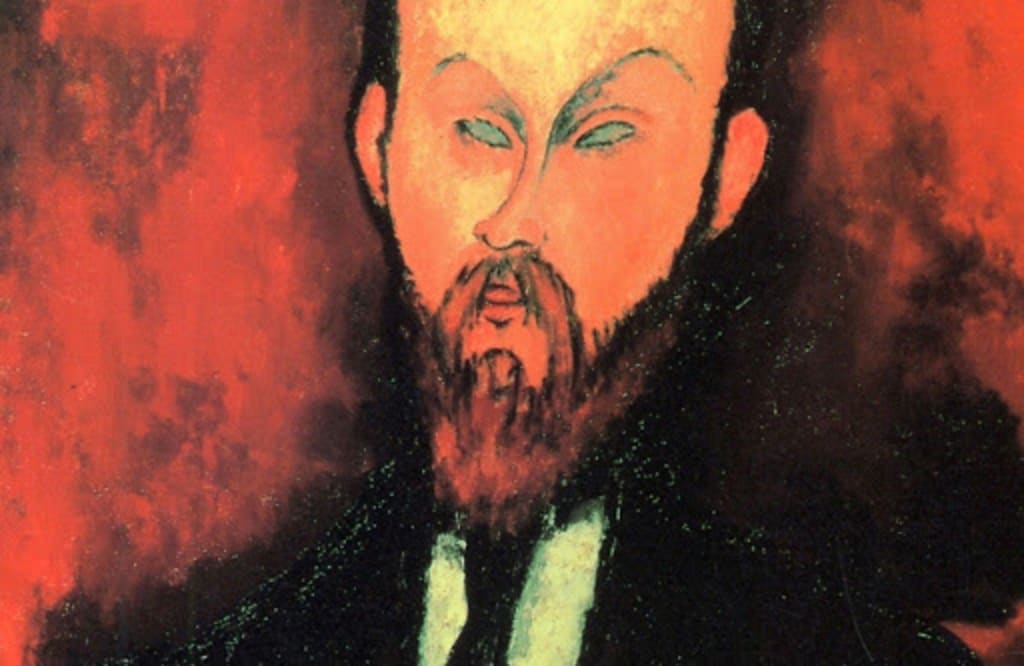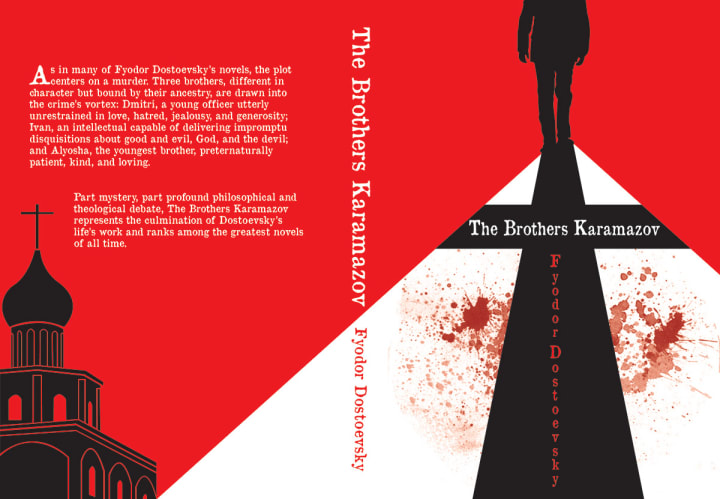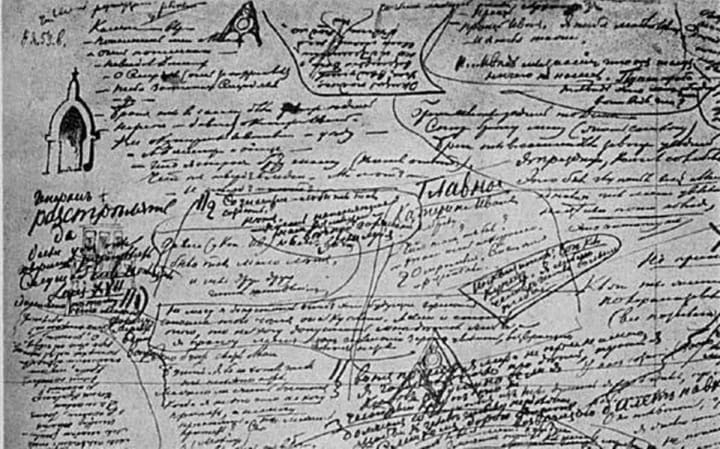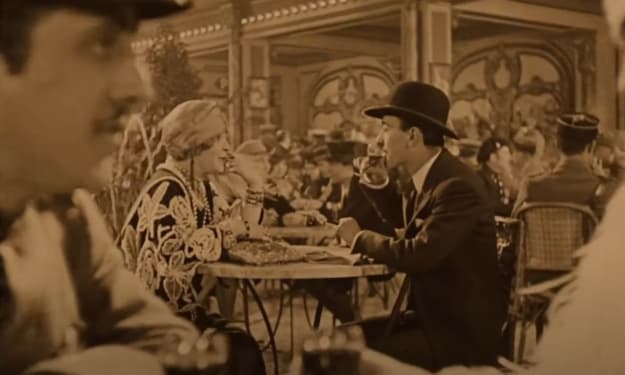"The Brothers Karamazov" by Fyodor Dostoevsky
A Reading Experience (Pt.2)

I first read “The Brothers Karamazov” by Fyodor Dostoevsky when I was about fourteen years’ old and I’m not going to lie to you, it confused me. It confused me because it was unlike any other Russian novel I had read up to that point and I realised then that things were about to get ever more interesting on my journey in literature. The way in which I discovered this book wasn’t actually at all that interesting. I had heard of it because I had seen the classic movie poster and thought it was a book cover. I looked it up and I got turned towards the book rather than the film (I would only realise some years later that it was actually a film poster I was looking at and not a book cover). I did not yet know, looking at that picture, that this book would come to change everything about my perception of Russian Literature and my perception on the possibilities of human connections in literature. It was almost overwhelming.
My favourite character in this book has been, and will always be, Aloysha Fyodorovich Karamazov. Aloysha is very different from his cunning almost sly brothers (Dmitri and Ivan) and way different to his almost machiavellian brute of a father (Fyodor Pavlovich). Aloysha is the moral compass of the book, much like Princess Maria in “War and Peace” by Tolstoy - Aloysha cannot be swayed or pushed about - he goes by the Lord. Aloysha is also very calculating. He always thinks before he speaks, he always observes and analyses a situation before walking into it, sometimes he misjudges and makes mistakes, but it is never as big as some of the things his brothers become accused of. When it comes down to it, the only character you can trust in the entire book is Aloysha Fyodorovich Karamazov. Hurrah for Karamazov! (You will only get that joke if you’ve read the book, which is yet another reason to read the book). I believe that Aloysha not only represents the moral compass and the morality question of the book but he also represents the truth. He represents the truth in the sense that he is always there when a truth needs to be recorded or told. For example: take the part where the boys are throwing stones - Aloysha is there, gets access to the truth about the situation and because of his great character, he is mostly believed. Yet, Aloysha also represents naivety in youth. He believes that most people are good and will react well to truths. He is very wrong and most of the time, he is told to shut his mouth, cover up truths or pretend that he didn’t see them. It is impossible for Aloysha to win, but yet he never gives up on his want for the truths of the novel. Aloysha’s only fault is his naivety. He is the youngest brother and so, in his piety and truths, he believes that not only is everyone good - but he believes that most people are also trustworthy. His judgement of character is not as perfect as his brothers’. Be that as it may, it actually takes all three of them to bring the truth out. The cunning of Ivan, the confrontational attitude of Dmitri and the pious truth of Aloysha.

One of the themes in this book that stood out to me was the difference between kindness and cruelty. There are many forms of cruelty in the novel including the cruelty which you must admit that Dmitri suffers at the hands of his father in which he is paid none of the money he is owed back and, even in court, is made out by his father to look like the villain. A certain amount of attention should be paid to the novel in that we believe as the reader that Dmitri is being cruel and unkind expecting his father to pay him back, whereas Fyodor Pavlovich has been most cruel and unkind to Dmitri in his youth and up to his adulthood and will continue to be so even after the hearing. This is the real truth that only comes out as we approach the situation involving Grushenka. Cruelty also appears in various pieces of dialogue. When you read the book, you will notice that Dmitri speaks with more of a confrontational voice. More of Dmitri’s speech sounds harsher and angrier than say, someone like Alyosha. On some occasions, we can definitely see that these patterns of temperamental dialogue are also within the speech of Fyodor Pavlovich and even Smerdyakov. The latter should tell you a lot about who he inherited that from and therefore, pretty much give away most of the novel in a sense that if it wasn’t one of the three brothers Karamazov, then it must have been the only one left.
“The Brothers Karamazov” by Fyodor Dostoevsky means so much to me, you have no idea and I have no idea where to begin. It has constantly been my reference if I want to revisit and revive my interest in human cruelty through language, temperament, accusation and money. If I really want to see how far humans will go in order to cover their truths, I will revisit this book once more. I also like to read this book as a treat to myself for doing something especially good - like reaching my reading targets for the year. This book definitely impacted my latter reading experiences because it was the first Dostoevsky I had ever read. After this, I read “Crime and Punishment”, “Notes from Underground”, “The House of the Dead” and then “Demons” - that was just over the coming year and a half after reading “The Brothers Karamazov”. In the future, I would read more widely into Dostoevsky and see what he really meant, collecting essays and annotated collections of his works along the way.

Within my re-readings of this book (and I have re-read it a few times), I have come to realise that every single character has a cruel side to them - even Alyosha. Alyosha is a cruelty of silence, refusing to acknowledge or be part of certain predicaments in which his brothers may require him. Dmitri has a cruel temper, Ivan has a cunning cruelty, Smerdyakov has a prying cruelty, Grushenka has a duplicitous cruelty and even the minor characters play along in this machiavellian philosophical masterpiece. The very best thing about this book though is that you can see that every single character is quintessentially human. They experience feelings of intense rage, intense grief and whatever they feel, they feel with such intensity it seeks to destroy their very soul.
I believe that way more people should read this book because even though it is widely read, I think that “Crime and Punishment” is still in the lead. “The Brothers Karamazov” is seriously underrated and I believe that not only will it show you the darker side of Russian Golden Age Fiction, but it will also introduce you to a whole new way of writing about murder and suicide. This book is certainly read by people today because of the intensity, the sheer nail-biting thrill and the brutal cruelty that is experienced throughout. It is one of those books that when you read it, it beats you up. It makes you feel every single bit of torture upon Dmitri’s soul, every headache Ivan has, every inching doubt and fear creeping through Alyosha’s mind and each and every pang of grief felt in the breaking mind of Fyodor Pavlovich. In my next re-read, I want to investigate exactly how Alyosha may display signs of doubt in himself, his certainty sometimes is almost wavering with doubt from every direction. But I have never analysed it and this time, I will be more apt.
“And what's strange, what would be marvellous, is not that God should really exist; the marvel is that such an idea, the idea of the necessity of God, could enter the head of such a savage, vicious beast as man.”
"The Brothers Karamazov" by Fyodor Dostoevsky
About the Creator
Annie Kapur
200K+ Reads on Vocal.
English Lecturer
🎓Literature & Writing (B.A)
🎓Film & Writing (M.A)
🎓Secondary English Education (PgDipEd) (QTS)
📍Birmingham, UK






Comments
There are no comments for this story
Be the first to respond and start the conversation.